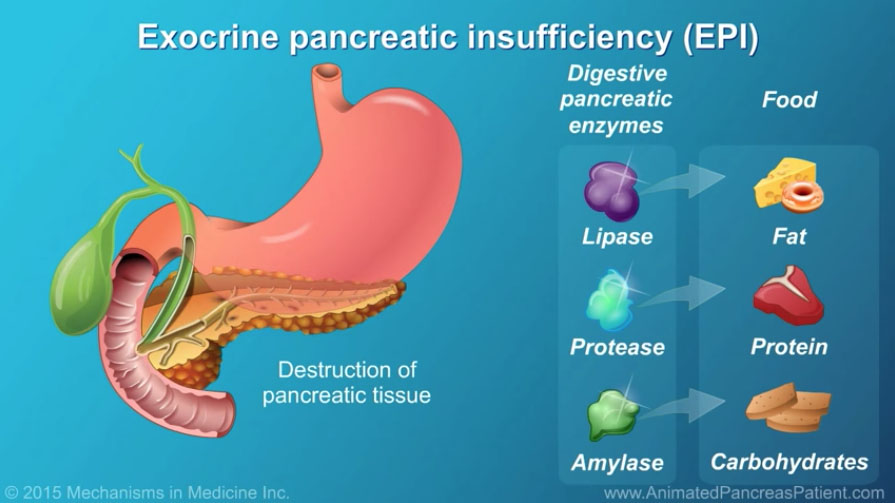
Exocrine Pancreatic Insufficiency (EPI) is a condition characterized by the inability of the pancreas to produce enough digestive enzymes to properly digest food. This can lead to a range of symptoms that can greatly impact a person’s quality of life. Recognizing the signs of EPI is important for early diagnosis and management of the condition.
In this article, we will discuss the common symptoms of EPI and how they can manifest in individuals. It’s important to note that the symptoms of EPI can vary from person to person, and not everyone with the condition will experience the same signs. However, being aware of these symptoms can help individuals seek medical attention and receive the appropriate treatment.
Unexplained Weight Loss
One of the most common symptoms of EPI is unexplained weight loss. This occurs because the body is unable to properly absorb nutrients from food due to the lack of digestive enzymes. As a result, individuals may experience a gradual but steady loss of weight despite maintaining their regular diet. If you notice a significant drop in weight without any changes to your diet or exercise routine, it’s essential to seek medical advice to rule out EPI.
Abdominal Pain and Discomfort
Individuals with EPI may experience chronic abdominal pain and discomfort, particularly after eating. This is often caused by the inability of the pancreas to properly break down fats, leading to poor digestion and resulting in discomfort. The pain may range from mild to severe and can significantly impact an individual’s quality of life. It’s important to consult with a healthcare professional if you experience persistent abdominal pain to determine the underlying cause, including EPI.
Excessive Gas and Bloating
Another common symptom of EPI is the presence of excessive gas and bloating. This occurs as undigested food moves through the digestive system, leading to the production of gas and abdominal distention. Individuals with EPI may find that certain foods exacerbate these symptoms, and it’s essential to identify and avoid trigger foods. Managing gas and bloating can significantly improve an individual’s overall comfort and well-being.
Chronic Diarrhea
Chronic diarrhea is a hallmark symptom of EPI, as the lack of digestive enzymes can lead to malabsorption of fats and subsequent bowel disturbances. Individuals with EPI may experience frequent, loose stools that are difficult to control. This can lead to dehydration and nutritional deficiencies if left untreated. If you notice persistent diarrhea that does not resolve with over-the-counter remedies, it’s important to seek medical attention to explore potential underlying causes, including EPI.
Foul-Smelling Stools
One distinguishing characteristic of EPI is the presence of foul-smelling stools, often described as greasy or oily. This is due to the high fat content in the stools, resulting from the malabsorption of fats in the digestive system. It’s important to pay attention to changes in stool odor and consistency, as these can provide valuable insights into digestive health. If you notice persistent changes in your stool characteristics, it’s advisable to consult with a healthcare professional for further evaluation.
Malnutrition and Vitamin Deficiencies
Due to the poor absorption of nutrients in individuals with EPI, malnutrition and vitamin deficiencies are common. This can manifest as a lack of energy, muscle weakness, and an overall decline in health. Additionally, deficiencies in fat-soluble vitamins such as A, D, E, and K can lead to a range of health problems. It’s important for individuals with EPI to work closely with a healthcare provider to address nutritional deficiencies and maintain optimal health.
Steatorrhea
Steatorrhea refers to the presence of excess fat in the stool, resulting in pale, bulky, and particularly foul-smelling feces. This occurs when the digestive system fails to absorb fats properly, leading to their excretion in the stool. Individuals with EPI may notice changes in their stool consistency and appearance, which can be indicative of the condition. Monitoring stool characteristics can provide valuable information for healthcare providers to assess digestive function and determine appropriate interventions for EPI.
Loss of Appetite
Loss of appetite is a common symptom in individuals with EPI, as the body struggles to digest and absorb nutrients from food. This can lead to a reduced interest in eating, further exacerbating the nutritional deficiencies associated with the condition. It’s important for individuals with EPI to work with a healthcare professional to develop a dietary plan that supports adequate nutrient intake and addresses changes in appetite. Understanding and addressing the underlying causes of appetite changes is crucial for managing EPI effectively.
General Weakness and Fatigue
General weakness and fatigue can be a result of malnutrition and vitamin deficiencies in individuals with EPI. The lack of essential nutrients can lead to decreased energy levels and a sense of overall weakness. This can impact daily activities and affect an individual’s quality of life. It’s important to address nutritional deficiencies and manage EPI effectively to improve energy levels and reduce fatigue. Healthcare professionals can provide guidance on dietary strategies and supplementation to support overall well-being.
Chronic Pancreatitis
Chronic pancreatitis is a known risk factor for the development of EPI. The persistent inflammation of the pancreas can lead to damage and scarring of the pancreatic tissue, affecting its ability to produce digestive enzymes. Individuals with a history of chronic pancreatitis should be mindful of the potential for EPI and pay attention to any signs or symptoms that may indicate the condition. Early diagnosis and intervention can help manage the effects of EPI and improve overall digestive health.

















